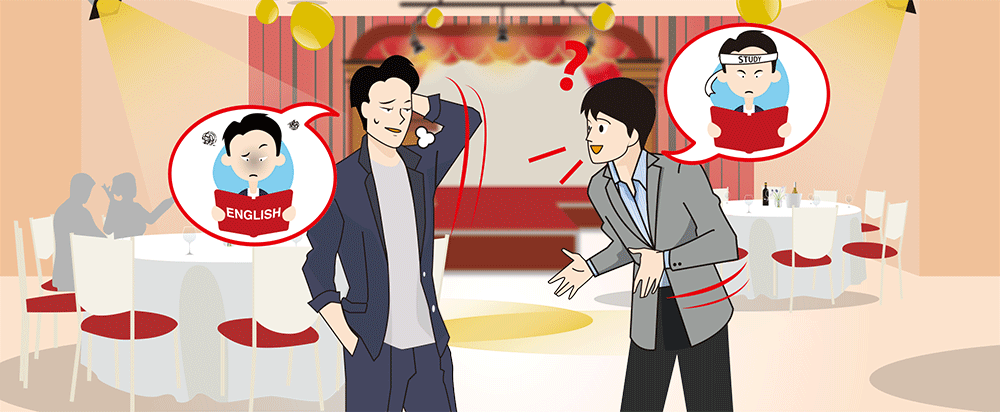Today's Point
今日のポイント〈What+~(be動詞の疑問文)〉で、「~は何ですか?」、〈What+~(一般動詞の疑問文)〉で、「何を~しますか?」と尋ねる表現です。
例えば、What is his job?「彼の仕事は何ですか?」、What do you want?「何が欲しいの?」のようになります。「今日のストーリー」にもWhat do you like about it?がありますね。
キーフレーズWhat are you studying?は、〈What+現在進行形の疑問文〉で、「何を~していますか?」と尋ねる表現です。現在進行形に関しては、Unit 6を参照してください。
なお、文脈によって「どのように、どんな、どのくらい、いくら」などと訳す場合があるので注意しましょう。例えば、What do you think?「あなたはどのように思いますか?」のようになります。

今日はハヤブサ・モータース主催のパーティ。たくさんの取引先を招待しています。
ケンは、友人で取引先の社員でもあるマイクと談笑しています。
「何を勉強しているの?」とケンに聞くマイクも、語学スクールで英語の勉強中です。
スクールが終わったら、故郷の台湾に帰るそうですが、セブが大好きなマイクはあまり帰りたくなさそうです。
マイクがセブを好きな理由は、食べものとビーチと、それから…。

Story of the Day
今日のストーリーRepeat after your teacher.
先生の後に続けて言ってみましょう。
| Ken : Hi Mike. How are you doing? | ケン : やあ、マイク。調子はどう? |
|---|---|
| Mike : I’m doing great. How about you? | マイク : すごくいいよ。君は? |
| Ken : I’m alright. I’m a little busy studying. | ケン : 大丈夫だよ。ちょっと勉強で忙しいんだ。 |
| Mike : What are you studying? | マイク : 何を勉強しているの? |
| Ken : I’m studying English. | ケン : 英語だよ。 |
| Ken : I was transferred to the Cebu office, but my English is not very good. | ケン : セブのオフィスに出向になったんだけど、僕は英語はあまり上手でなくて。 |
| Ken : Are you studying English too? | ケン : 君も英語を勉強しているの? |
| Mike : Yes. I’m studying at a language school here. | マイク : うん、ここの語学スクールで勉強しているところだよ。 |
| Mike : I will go back to Taiwan when it’s finished. | マイク : 終わったら台湾に帰るけど。 |
| Ken : I see. Are you enjoying Cebu? | ケン : なるほど。セブの生活楽しんでいる? |
| Mike : I love it here. | マイク : ここは好きだよ。 |
| Ken : What do you like about it? | ケン : ここの何が好きなの? |
| Mike : I like the food and the beaches. | マイク : 食べものとビーチ。 |
| Mike : And... | マイク : それから…、 |
| Ken : And? | ケン : それから? |
| Mike : Well, I met a very nice Filipino lady the other day. | マイク : ええと、先日とっても素晴らしいフィリピン女性に出会ってね。 |
| Ken : Lucky man! | ケン : この幸せ者! |
Key Phrase
キーフレーズRepeat after your teacher.
先生の後に続けて言ってみましょう。
What are you studying?
Vocabulary / Expressions
ボキャブラリーと表現Repeat after your teacher.
先生の後に続けて言ってみましょう。
| alright(形容詞) | 大丈夫で、元気で |
|---|---|
| transfer(動詞) | 転勤する、転任する |
| finished(形容詞) | 終えている |
Exercise
エクササイズ ARead the conversation aloud with your teacher. Fill in the blanks with a, b and c.
After that, fill in the blanks with your own words and practice the conversation with your teacher.
下記の会話の空欄に、a, b, cそれぞれの言葉を入れて、先生と一緒に音読してみましょう。
そのあと、空欄に入る言葉を自分で考えて、先生と会話をしてみましょう。

| Ken : Hi Mike. How are you doing? | ケン : やあ、マイク。調子はどう? |
|---|---|
| Mike : I’m doing great. How about you? | マイク : すごくいいよ。君は? |
| Ken : ________ (a. I’m good b. I’m doing OK c. Not bad). I’m a little busy studying. | ケン : (a.大丈夫だよ b. なんとかやってるよ c. 悪くないね)。ちょっと勉強で忙しんだ。 |
| Mike : What are you ________ (a. learning about b. trying to learn c. doing now)? | マイク : 何(a. について勉強している b. を勉強しようとしている c. を今している)の? |
| Ken : I’m studying English. | ケン : 英語だよ。 |
| Ken : I was transferred to the Cebu office, but my English is not very good. | ケン : セブのオフィスに出向になったんだけど、僕は英語はあまり上手でなくて。 |
Exercise
エクササイズ B (Vocabulary Building)Choose the correct word from the box.
空欄に当てはまる言葉を選んで文章を完成させてください。
- alright
- transferred
- finished
- Are you ________ with your homework?
- ________. I understand now.
- I was ________ to a new section last month.
Exercise
エクササイズ CSituation : Your friend is cooking something in the kitchen. Ask her what she is cooking?
ロールプレイ : 友人が台所で料理をしています。何を料理しているか聞いてください。


Extra Exercise
Try the Extra Exercises. As with Exercise A, become familiar with some of these more advanced phrases.
エクストラ・エクササイズに挑戦してみましょう。
エクササイズAと同じ要領で、より高度なフレーズを練習してみましょう。
| Ken: What (a. is your favorite food b. do you feel like eating c. is the type of cuisine you like the most), Jiu? |
|---|
| Jiu: I like all kinds of food. |
| Jiu: I especially like spicy food. |
| Ken: Me too. |
| Ken: We have the same taste in food! |
| Jiu: What (a. did you like to eat b. was your favorite food c. did you always crave) when you were a kid? |
| Ken: I used to love hamburgers. |
| Jiu: Me too! |
| Jiu: Well, what are we going to eat tonight? |
| Ken: There’s a tapas bar I want to try. |
| Jiu: That sounds good. |
| Ken: Great! Let’s go. |
| Jiu: Actually, you know what? |
| Jiu: There’s a Korean barbecue place near my office. |
| Jiu: It’s amazing! You have to try it. |
| Ken: Oh, okay. Sure. |

- used to ~は、「(助動詞)以前は~だった」という意味で『過去の状態』を表しています。つまり、I used to love hamburgers.は「昔はハンバーガーが大好きだったよ」ですね。なお、「以前は~したものだった」という『過去の習慣』を表す場合もあります。例えば、We used to go out every Friday.「僕たちは毎週金曜日に出かけたものだった」のように使います。
- you know what?は「あのね」という意味で、相手の注意を引きたいときに用います。
- craveは「熱望する」。